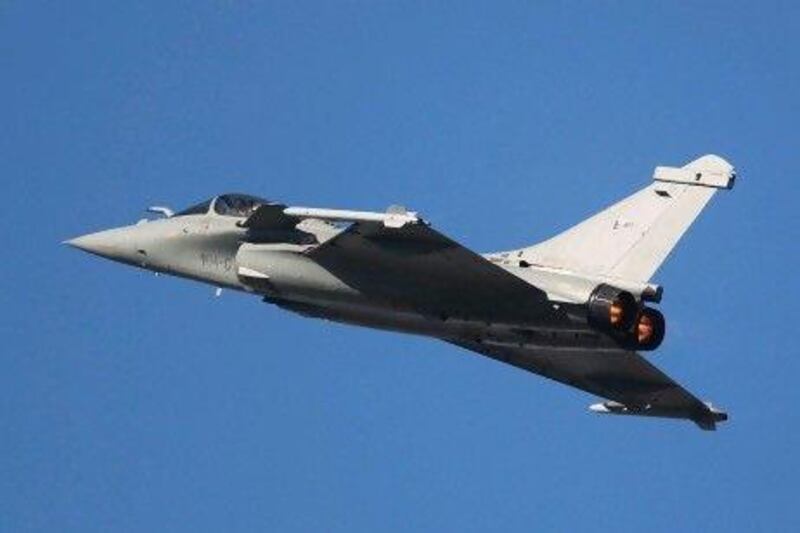Cruising near the speed of sound across the skyline, a fighter jet twists and climbs at a seemingly impossibly sharp angle, several hundred feet in seconds, leaving behind a trail of smoke that dangles in the sky. Onlookers crane their necks, squinting in the sunshine for a better view of the aerobatics.
Come fly with us:
Industry Insights Take to the skies with The National as it charts the aviation industry. Learn More
The drama in the skies above the Dubai Airshow is a reflection of the high-stakes battle being waged in the industry "chalets" below.
For the world's leading defence companies, the air show offers an opportunity to showcase their latest technology to potential buyers in one of the world's wealthiest markets.
Adding urgency for the European and US suppliers at the show is the tightening defence budgets in their domestic markets.
"The Gulf is an increasingly important market and will become even more so as countries upgrade their defence systems," says General Khaled Al Bu-Ainnain, the president of the Institute for Near East and Gulf Military Analysis.
GCC states will spend more than US$5 billion (Dh18.36bn) on air defence this year, according to estimates by the consultancy Frost & Sullivan. That category of spending is estimated to exceed $8bn next year and to reach a total of nearly $63bn by 2020, it says.
In contrast, the US - the world's biggest defence spender - plans to prune its defence budget by $260bn over the next five years.
Many countries in Europe are also reducing military spending as austerity measures and the sovereign-debt crisis bite. The contest to sell combat aircraft to the Emirates is in full swing.
Dassault of France had appeared to be in the driving seat, having been locked in negotiations with the UAE Armed Forces about the sale of about 60 Rafale fighter jets in a deal worth $10bn. But it emerged on Sunday that Eurofighter, a consortium of defence firms, had been approached by the Government for a briefing on the capabilities of the Typhoon, a rival jet. The consortium was invited to submit an offer to supply the same number of jets.
"We will put together a proper proposal, which will take time, and we understand the Emiratis will require time to properly assess the aircraft, particularly in light of its performance in Libya," says Gerald Howarth, the minister for international security strategy in the UK.
Eurofighter is a consortium made up of BAE Systems of the UK, Finmeccanica of Italy and the pan-European aerospace group EADS.
Regionally, Eurofighter is already in advanced negotiations about the sale of Typhoon to Oman and is supplying 72 aircraft to Saudi Arabia. It is also vying to supply jets to Qatar.
By contrast, the Rafale has to yet to secure a buyer outside France.
Both Dassault and Eurofighter point to the role of their aircraft in the removal of Muammar Qaddafi's regime in Libya. While the Rafale was the first aircraft to engage in Nato operations in the country, the Typhoon made its combat debut in the campaign.
This and previous regional conflicts have demonstrated to GCC governments how command of the skies can prove decisive in combat as well as acting as a deterrent to aggression, say analysts.
"This has convinced them that the only way to safeguard national security is to invest in cutting-edge air assets," Sabbir Ahmed, the defence and security analyst at Frost & Sullivan, wrote in a recent research report.
As the region's biggest economy, Saudi Arabia is expected to overtake the UAE to become the largest market for military hardware in the coming years. The kingdom was responsible for the biggest US foreign arms deal when it booked $60bn of military hardware last October. The sales included Raytheon's 2,000-pound bunker-busting bombs, Boeing's F-15 fighter jets and Sikorsky's Black Hawk helicopters.
To help to secure such hefty procurement contracts, suppliers are usually required to offer incentives in the form of investments in other parts of the purchasing country's economy.
Known as offsets, these investments have already contributed billions of dollars to diverse sectors of the UAE economy, including the construction of infrastructure at a huge residential development at Al Raha Beach and the establishment of several companies including the aircraft leasing company Waha Capital, the district cooling company Tabreed, and the fish-farming venture Asmak.
After a 2008 deal worth up to $3.8bn for the Patriot anti-missile defence shield, Raytheon helped to develop science curriculums with Abu Dhabi's Higher Colleges of Technology.
"Raytheon's long-term development strategy is to provide technology transfer and knowledge transfer," says Kevin Massengill, the Raytheon vice president and regional executive for the Middle East and North Africa.
To reduce their reliance on international defence companies, the UAE and other GCC states are striving to build their own capabilities. Mubadala Aerospace on Monday signed a contract with Boeing to provide greater maintenance, repair and overhaul services to UAE military aviation units.
The deal will mean Boeing-built Apaches, Chinooks and C-17s in the UAE Armed Forces will have greater support infrastructure.
Over the coming decades, how far the region will be able to transform itself from a buyer to a partner in the defence system supply chain is unclear. Some in the industry already see potential for a greater role.
"People here have a willingness to develop their own technology, and financial resources and hard work are always a good recipe," says Håkan Buskhe, the chief executive of the Swedish defence and security company Saab. "This part of the world will take a bigger portion of the global defence market, no doubt about that."
One day, the skies above Dubai could be filled with the roar of a fighter jet made in the Gulf.





